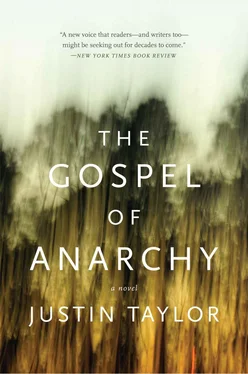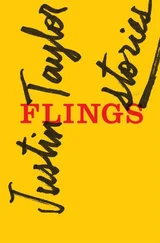Katy notices they’re being eyed by a pair of student volunteers. The volunteers have white name tags on their crisp white clothing: her blouse, his polo. They glance over, then turn back to each other, then glance, then turn again. Katy feels an attack of self-consciousness, a moment of crushing doubt, like the other night. It comes from nowhere, the cold hand of despair grasping her heart.
The three of them stink to hell, their grimed bodies and clothes in this merciless sun. And their attempt at dress code, the thrift store regalia, Katy’s parrot-green mop not even brushed — who are they kidding? Their best attempt at appearing civilized is basically indistinct from parody. Not their intention, of course, but try telling that to the morality squad over there. Katy shifts her weight from one leg to the other, like a kid who has to go potty. Nervousness flashes over her whole body like the cold blast that greets you at the door of a walk-in freezer. It makes her breath short. She dry-swallows her butter cookie. Her lemonade’s all gone but she can’t refill her glass — won’t, anyway — because she knows they’re watching her, all three of us, thinking how we’re just dirty punks here for a free snack, freeloaders, which of course is a part of the truth, but not even close to the whole. Hell, not even the half.
She’s about to announce that it’s time to bolt when the student volunteers start heading over. Too late to run now that there’s been eye contact. Got to deal with whatever it is. She can read the name tags now, so it’s not just anyone, it’s SARA and ZACHARY with the big smiles fixed to their faces. They’re young, freshmen probably, or maybe he’s a sophomore. But this girl, yeesh, she’s got braces . “Hi,” she says, and puts her hand out for any of the three of them to take. Liz and David expect Katy to take the lead here, but after a long second it becomes clear she’s not going to, so David reaches out and shakes hands with Sara, who beams. Liz says hello to Zachary; he nods at her.
“Welcome to St. Augustine,” Sara says. “Is this your first time with us?”
“Why yes,” David says. “Today’s the day.” Big dopey smile. Katy can’t tell whether he’s making fun of the girl and she doesn’t get it, or if he’s actually meeting her on her own level, somehow, and she’s thrilled to have him there.
“Well, it’s great that you’ve decided to join us,” Sara says, addressing the empty space between David and Liz, ignoring Katy altogether, presumably because Katy declined to introduce herself. “Let me tell you a little bit about what goes on here. Are you students?” Zachary stands a few steps behind Sara, supervising or else trying to watch and learn. He could be her boss or he could be her trainee. Katy’s taken a couple of steps back herself, is sort of off to one side now, adjunct to the circle but not part of it. She feels miles away. David looks at Katy — she gives him nothing — then turns back to Sara and says, yes, they’re students. “Great,” Sara says, her happy voice rising to a bona fide chirp. “We have all kinds of activities and groups for our Catholic Gators.”
Katy wanted to be the one to take the hand. So why did she freeze? Not because she really thought they were going to be asked to leave — she’s been here enough times to know that their whole thing is to be all-embracing. At St. Augustine they strive to break the stereotype of the church as some medieval behemoth burning the last candle for a geocentric universe. That whole thing about being thrown out was just her panic talking.
Truth is, these Catholics’ moderateness, and more generally their modernity, is at the heart of what spooks her about them. How the archness and archaism of their faith seems to fit so snugly in with the regular lives they’re all living right now. What can the gilded crucifix, and the Man hung thereon, mean to the boy who buys sweatshop-produced Nikes at the mall by the highway? To the girl with the sorority pin, or anyone behind the wheel of an SUV? She knows these are cliché questions, straight out of Anticapitalism 101, but cliché or not, the questions are earnest. How can it be that the crucified Christ means so many different things to so many different people, all at once? How can He contain it all?
Katy hears David and Liz thanking the two student volunteers, though all the boy did was stand there. The good-byes bring her back to earth. She sees that David now has a trifold pamphlet in his hand: Catholic Living and Today’s College Student . They crunch up their paper cups and toss them in a blue plastic garbage can the size of an oil drum. It’s about three-quarters full. They walk out of the courtyard onto University, then take the first available left off the main road. David tosses the pamphlet in a metal wastebasket on a corner. They’re back in the student ghetto now, on oak-shaded streets lined with run-down houses filled with nonnuclear families of all varieties and kinds. Safe now from the tractor beams of the horrible good Christians, they’re together in a place where they can be themselves, free as the day God made them, headed home.
Their route happens to take them by David’s apartment building. It took a few days to get the information out of him, and when he finally told them where he lived he actually apologized. Unlike with the porno thing, a subject they haven’t broached again and won’t, this they took him lengthily to task on. They made him understand exactly how and why corporate real estate is destroying the student ghetto, and more generally, the town. That was a good exchange; by the end of it they’d had to talk him out of burning the damn complex down.
“High style,” Liz says, with a nod toward the building, obviously relishing the chance to give him grief. It’s basically good-natured ribbing, David knows, but still, when he thinks about his life up until a week ago — how lost and miserable he was, how he barely even understood what he was feeling — he has a hard time holding it together. The alienation from the self. The — is ennui the word? Soul-suffering? Despair? Since he met them, life has been one unrelenting miracle. He’d like to blot out everything before last Sunday and believe himself newborn, reborn, in a world itself newly established, exactly one week old.
“Forget it,” Katy says, seeing the shadow over his face, lips pursed in the international language of not handling this well . “Seriously.” She laughs again.
“I bet you’ve got all kinds of cool shit in there,” Liz says. “Big-screen TV, right?”
Katy gives Liz this complex-sentence look that says, Do me a favor and lay off him; I’ll make it worth your while later. But, interestingly, it’s Liz’s remark that seems to have perked David up.
“Well, it’s not a big screen but — yeah, there’s a TV. Other stuff, too.” He pauses. There’s a thought forming. They’re about a half block past his building, paused on the sidewalk, Katy’s hand in the space between his shoulder blades, rubbing. He’s looking back at the complex. They’re looking at him. He turns to them again, eyes big.
“What we need is a, like, raiding party.”
They all let that hang there a second.
“Got your keys?” Liz asks.
“They’re back at the house somewhere.”
“Anyway, it makes more sense to come at night,” Katy says.
“Why?” says Liz. “You don’t have to sneak around when it’s your own shit you’re stealing.”
So they book it back home and start digging around in the couch cushions and the piles of crap on the bedroom floor, looking for the keys. David remembers now: he slipped them out of his pocket, along with his wallet, that first night. He’d put both items on the nightstand, Liz’s side, because at that point he’d known her longer. The wallet’s still sitting right where he left it, but the keys are gone. Amazing to think he could live a full week of life without needing to use or even see any money, his driver’s license, the keys to his own house. These people know what freedom means. He is so lucky and grateful to have been found. And sure enough here the keys are, underneath the nightstand, where they must have fallen. All the way back by the wall.
Читать дальше












